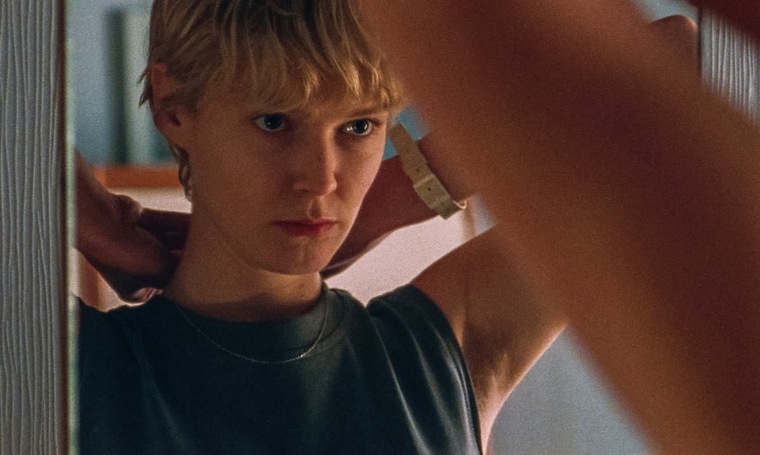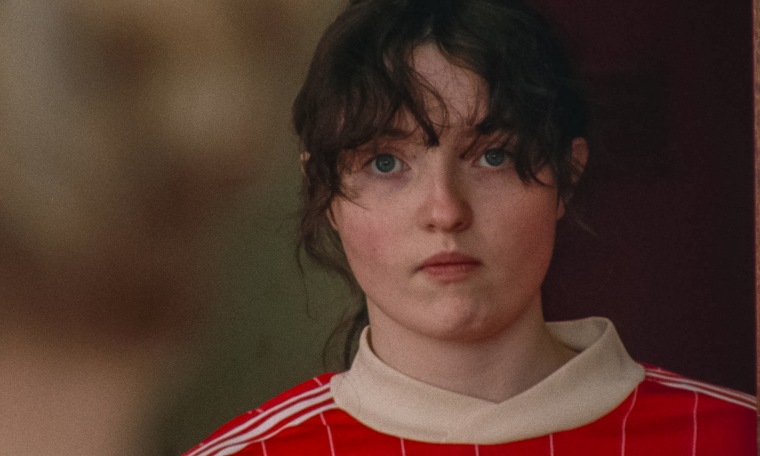In 1988, Margaret Thatcher’s Conservative government in Britain passed what would come to be known as Section 28, an amendment of the Local Government Act that prevented local authorities and schools from “promoting” homosexuality. It was just over two decades since the overturning of England’s so-called sodomy laws, which essentially criminalized homosexuality for centuries. And the news sent shockwaves through the country’s queer communities and a generation of adults who had grown up believing that their right to live outside of the closet was at least codified in law.
Against this backdrop, filmmaker Georgia Oakley sets her first feature film, “Blue Jean,” which centers on a young, gay physical education teacher living in the North of England, whose personal life begins to crumble as her professional one becomes increasingly uncertain and she acts out of desperation to hold on to them both.
“Bigger political, historical stories often focus on one person’s acts of heroism or a group of people’s acts of heroism,” Oakley told NBC News on a call with the film’s lead, Rosy McEwen. “I’m more interested in why ordinary people are pushed to make difficult decisions that they might later regret as a result of the political situation they find themselves in.”
As Oakley suggested, her protagonist isn’t one of the heroes of the swift and vocal opposition movement that popped up in response to Section 28; she’s not even the hero of her own story. But Jean reflects many of the educators whom Oakley came across when she began researching Section 28, which only ended in England in 2003. Unlike the celebrities and activists who were praised for speaking out against the amendment, these teachers often felt forced to stay silent — and silence others — out of fear of being villainized and losing their jobs.
For those working in physical education, especially the ones living in small towns in the North, these effects were even greater, Oakley said. Outside of their schools, local bars and shops were places they might be seen living in a way that promoted, as Section 28 described it, “the acceptability of homosexuality as a pretended family relationship.” And at their schools, spaces like gyms and locker rooms, where they were forced into close physical proximity with students — and most vulnerable to dangerous accusations — became the stuff of nightmares.
“Before we actually met with the lesbian PE teachers who inspired the story, I had read some of their accounts and I was really struck by the parallels,” Oakley said. “There were a lot of women unraveling mental health problems. They would go into the details of what that experience felt like, what it was to lead that kind of double life. And the showers came up time and again.”

In “Blue Jean,” Oakley draws on these experiences and images to show how a person, already weakened by a lifetime of internalized homophobia, can be physically and morally broken under the accumulating weight of government scrutiny, subtle homophobia and insidious stereotypes.
When the atmospheric film opens, Jean — who is masterfully played by McEwen, also making her feature debut — is bleaching her late-‘80s boyish cut and readying herself to put on her various masks in the days ahead. At the secondary school where she teaches, she’s the popular but standoffish PE teacher and girls netball coach. At home and in her local queer-friendly pub, she’s “Baby Jean,” her friend group’s fledgling member and the shy girlfriend of an outspoken, tattooed lesbian named Viv (Kerrie Hayes). With her family, Jean is the beloved aunt and offbeat sister who threw away her marriage and suburban, middle-class life.
Early on, there are signs that this fragmenting of her life — which she’s accomplished by living far from where she works and socializes and keeping Viv away from her co-workers and family — has taken a toll. Among them, she has trouble sleeping, a pronounced smoking habit and a general unease around people. But by most accounts, her “plate-balancing situation,” as McEwen called it, is working. That’s until a new, queer student at school, Lois (Lucy Halliday), begins seeking out Jean’s company and showing up at her local bar.
Like a domino effect, the girl’s presence knocks down the walls segmenting Jean’s various lives, just as Section 28 is gaining momentum and she’s most desperate to hold them up. And the strain of it all begins to appear on her physically. With each radio segment and conversation about Section 28 that she overhears, Jean becomes jumpier and more withdrawn. And though it’s unclear if she’s actually being watched more than usual, she wears the look of someone who could be rooted out by locals with pitchforks at any moment.
To prepare for the role, “I surrounded myself with all the things that Jean would have been digesting at the time: newspaper articles and TV programs and images and subliminal messaging,” McEwen said. “That was a huge part of the way she felt; it was all the stuff that she’d grown up seeing, what she continuously read on a day-to-day basis, posters she saw, just constant reminders that what she felt was abnormal.”
Her aim, McEwen added, was to be able to channel a woman who is overcome by fear and frustration, but who also has the desire “to rip off these invisible shackles” that society is holding her with.

Although Oakley began developing her film in 2018, it’s not difficult to see the parallels between the climate that pushes Jean to the brink and the current one, in which Florida and other states have passed laws limiting the type of content that can be taught or discussed in schools and other public institutions.
Last year, Florida Gov. Ron DeSantis signed the Parental Rights in Education bill, which prohibits “classroom instruction by school personnel or third parties on sexual orientation or gender identity” in kindergarten through third grade “or in a manner that is not age-appropriate or developmentally appropriate for students in accordance with state standards.” Last month, DeSantis signed a bill expanding the law, which critics have dubbed the “Don’t Say Gay” law, to prohibit such instruction through eighth grade.
Since DeSantis signed the bill, educators have spoken out about their anxieties over teaching in the “Don’t Say Gay” era. And, like in 1988, the long-term impact of these relatively new restrictions on classrooms is still unknown. But many, like Oakley, have pointed out that it’s not just teachers who stand to feel the stigmatizing effects of these laws and the conversations around them.
In “Blue Jean,” that message is conveyed through the character of Sammy, Jean’s nephew, who the filmmaker pointed out is “a product of the same system” that has made Jean internalize so much hatred — a point that crystallizes near the end in a climactic scene involving, appropriately, the school showers. Throughout the film, Jean’s sister Sasha (Aoife Kennan) makes it clear that she intends to shield Sammy from his aunt’s sexuality. And the actions and comments she uses to communicate that to her sister are representative of the anti-LGBTQ ideas and rhetoric that children are exposed to from a very young age.
“I’m thinking all the time about what messages kids of that age are digesting on a day-to-day basis,” Oakley said.
“When I said that I was going to make a film about a lesbian teacher, I found that people quite close to me said things, like, ‘It is quite problematic having queer teachers,’” Oakley added. “There are people that are still so unaware of how insidious these stereotypes are and how much everybody seems to hold space for them without even realizing.”
